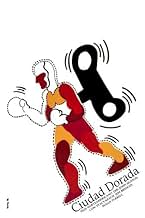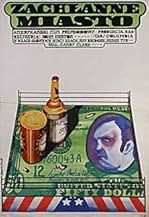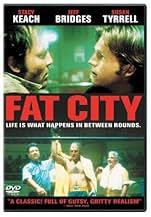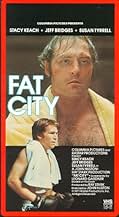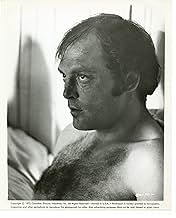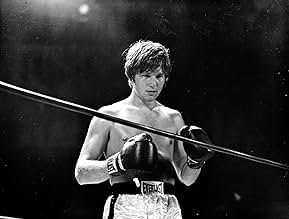IMDb-BEWERTUNG
7,2/10
11.013
IHRE BEWERTUNG
Füge eine Handlung in deiner Sprache hinzuTwo men, working as professional boxers, come to blows when their careers each begin to take different directions.Two men, working as professional boxers, come to blows when their careers each begin to take different directions.Two men, working as professional boxers, come to blows when their careers each begin to take different directions.
- Für 1 Oscar nominiert
- 4 Gewinne & 4 Nominierungen insgesamt
Álvaro López
- Rosales
- (Nicht genannt)
Carl D. Parker
- Paymaster
- (Nicht genannt)
Bill Riddle
- Boxer
- (Nicht genannt)
Al Silvani
- Referee at Tully-Lucero Fight
- (Nicht genannt)
Empfohlene Bewertungen
The down-to-earth tale of two small hall boxers -- at the opposite ends of their careers -- and the blows they take in and out of the ring.
This is one of the best American movies ever about normal working class lives where failure is common and the only thing you can do is pretend otherwise or drug it all away to nothing. I know why so many people prefer Rocky to this -- this is too real for them. Indeed it is almost too real for me!
Stacey Keach was given the role of lifetime in this. He really does look like a failing boxer turned to flab (although maybe that is nature -- not punches!) trying to find a life (of sorts) beyond the ring. Bridges really does look and sound like the daydreamer believer that makes the boxing game go round. Johnny No Talent who thinks he is Mike Tyson when his face finally clears up.
They don't make films like this anymore. The Europeans can, although they are rarely shown and end up too self indulgent. Everyone here gets what they deserve, which is sadly, very little. That is what sport is about in real life -- lots of people failing so that are very small few can succeed. The best the majority can hope for is some exercise and comradeship.
(This contrasts with most sports movies -- which are about glory. Or at least glory through struggle.)
This is the best late John Huston film and every single frame is a frame of reality and believability. Maybe that is what leads so many people to say "so what", the world outside their window has many of the same elements and there are many times you feel you are -- indeed -- looking at real life.
This is one of the best American movies ever about normal working class lives where failure is common and the only thing you can do is pretend otherwise or drug it all away to nothing. I know why so many people prefer Rocky to this -- this is too real for them. Indeed it is almost too real for me!
Stacey Keach was given the role of lifetime in this. He really does look like a failing boxer turned to flab (although maybe that is nature -- not punches!) trying to find a life (of sorts) beyond the ring. Bridges really does look and sound like the daydreamer believer that makes the boxing game go round. Johnny No Talent who thinks he is Mike Tyson when his face finally clears up.
They don't make films like this anymore. The Europeans can, although they are rarely shown and end up too self indulgent. Everyone here gets what they deserve, which is sadly, very little. That is what sport is about in real life -- lots of people failing so that are very small few can succeed. The best the majority can hope for is some exercise and comradeship.
(This contrasts with most sports movies -- which are about glory. Or at least glory through struggle.)
This is the best late John Huston film and every single frame is a frame of reality and believability. Maybe that is what leads so many people to say "so what", the world outside their window has many of the same elements and there are many times you feel you are -- indeed -- looking at real life.
Huston always had an eye for characters. His movies almost all dealt with the concerns of lower middle class working joes, the "regular fellows" with whom Huston somehow identified in the romantic Hemingwayesque lantern jawed "a man's gotta do what a man's gotta do" tradition. But his characters were more than mere macho he-men. They displayed genuine and uncommonly powerful vulnerabilities, hopes and dreams, flaws and finally cynicism. After an incredible first 20-plus creative years, Huston floundered for almost a decade with commercial and artistic disappointments (FREUD, THE BIBLE, THE KREMLIN LETTER, SINFUL DAVEY among them) before coming back to his wheelhouse with the carefully subdued yet deeply affecting character study FAT CITY.
FAT CITY is a grand return to form for Huston precisely because it is so indelibly imbued with real life in the form of its unforgettably true characters. None of these people are particularly remarkable individuals (frankly they are mostly below average in self-awareness, skills and intelligence), yet because Huston is so skillful at revealing character through the carefully structured unfolding (and gradual unhinging) of Keach's character, we are given insights which Keach (and Bridges and Candy Clark and the wonderful Nicholas Colasanto) can't make for themselves because they are too close to their own situations. Bridges has a nice interlude and Colasanto is so good in his limited Burgess Meredith Mickeyesque role, but the heart of this movie is Stacy Keach, who rises to the occasion with uncommon subtlety and power. It is a rare movie that can document losers in their daily lives without editorializing or sermonizing. FAT CITY takes an unflinching glance at these people and shows us things which seem prosaic on the surface but which upon examination hide deeper meaning (and heartbreak).
There are no pyrotechnics, no real twists, no witty or stand out dialogue exchanges, not much going on with the camera (though Hall's coloring is as always very well chosen), and very little budget on display in FAT CITY. It appears Huston shot pretty much everything on location in the flophouses around Stockton, CA. Yet the performances are uniformly outstanding and we come to care about these losers as they fumpher through life kidding themselves about where they've been, where they are and where they are going. I can't think of a movie where less actually happens to the characters (maybe BARFLY) but where I still find myself so deeply involved. Whenever I see it playing on the tube I generally stay with it all the way. There are very few movies in that league for me.
Warning: do NOT go in expecting crowd-pleasing Rocky-esque boxing sequences. This is less the story of a Rocky and more the story of a Spider Rico (the "ham n' egger" Rocky beats up in his first fight and from whom we never hear again.) The movie disguises itself as a Horato Alger-like comeback or underdog story initially, but it is ultimately one of the bleakest, realest character studies you're ever likely to see. One of the best Huston movies to come after the 1960s and a downbeat classic. 9/10.
FAT CITY is a grand return to form for Huston precisely because it is so indelibly imbued with real life in the form of its unforgettably true characters. None of these people are particularly remarkable individuals (frankly they are mostly below average in self-awareness, skills and intelligence), yet because Huston is so skillful at revealing character through the carefully structured unfolding (and gradual unhinging) of Keach's character, we are given insights which Keach (and Bridges and Candy Clark and the wonderful Nicholas Colasanto) can't make for themselves because they are too close to their own situations. Bridges has a nice interlude and Colasanto is so good in his limited Burgess Meredith Mickeyesque role, but the heart of this movie is Stacy Keach, who rises to the occasion with uncommon subtlety and power. It is a rare movie that can document losers in their daily lives without editorializing or sermonizing. FAT CITY takes an unflinching glance at these people and shows us things which seem prosaic on the surface but which upon examination hide deeper meaning (and heartbreak).
There are no pyrotechnics, no real twists, no witty or stand out dialogue exchanges, not much going on with the camera (though Hall's coloring is as always very well chosen), and very little budget on display in FAT CITY. It appears Huston shot pretty much everything on location in the flophouses around Stockton, CA. Yet the performances are uniformly outstanding and we come to care about these losers as they fumpher through life kidding themselves about where they've been, where they are and where they are going. I can't think of a movie where less actually happens to the characters (maybe BARFLY) but where I still find myself so deeply involved. Whenever I see it playing on the tube I generally stay with it all the way. There are very few movies in that league for me.
Warning: do NOT go in expecting crowd-pleasing Rocky-esque boxing sequences. This is less the story of a Rocky and more the story of a Spider Rico (the "ham n' egger" Rocky beats up in his first fight and from whom we never hear again.) The movie disguises itself as a Horato Alger-like comeback or underdog story initially, but it is ultimately one of the bleakest, realest character studies you're ever likely to see. One of the best Huston movies to come after the 1960s and a downbeat classic. 9/10.
Jeff Bridges is young and charming in this movie about an upcoming boxer who meets another boxer (Stacey Keach) who is going down the drain. First I expected it to be a standard boxer movie portraying a young man who was going to make it big. But soon I discovered this movie was about losing. About drunks and has beens. Depressing. But not so depressing that it isnt great to watch Stacey Keach perform a drunk so well. Another actress got nominated for an oscar, but it should have been Stacey Keach who really deserved an oscar. Never seen an actor perform a drunk so well. Almost couldnt believe that Keach was actually acting sometimes, because he looks so wasted and completely lost.
John Huston directed Fat City in a documentary kind of style. The photography resembles a real life look in the run down bars and boxing halls. Real life bums and poor people are being used as extras. This movie is depressing, even boring sometimes, but nevertheless still fascinating to watch, because of its true to life portrayal of everyday people.
My only criticism is that there is a romantic subplot with a woman that kinda slows down the movie in the middle. There is definitely a lack of dynamic in the middle. But hey, that is the life this drunk is leading. Nothing much happens except for another night with booze. And another... And if you can stumach a movie about losers who are going nowhere than you will appreciate this movie as much as I did.
However depressing the story might be at times, the photography and the acting are way up there, truly excellent!!! And because of these marvellous acting performances the depressing lowlife characters that are being portrayed in Fat City are still very endearing and fascinating to watch.
John Huston directed Fat City in a documentary kind of style. The photography resembles a real life look in the run down bars and boxing halls. Real life bums and poor people are being used as extras. This movie is depressing, even boring sometimes, but nevertheless still fascinating to watch, because of its true to life portrayal of everyday people.
My only criticism is that there is a romantic subplot with a woman that kinda slows down the movie in the middle. There is definitely a lack of dynamic in the middle. But hey, that is the life this drunk is leading. Nothing much happens except for another night with booze. And another... And if you can stumach a movie about losers who are going nowhere than you will appreciate this movie as much as I did.
However depressing the story might be at times, the photography and the acting are way up there, truly excellent!!! And because of these marvellous acting performances the depressing lowlife characters that are being portrayed in Fat City are still very endearing and fascinating to watch.
American audiences don't generally go in for realistic stories of human despair and suffering that offer very little in the way of hope or relief. This may explain why John Huston's Fat City has been condemned to obscurity, a real shame considering what a great flick it is. It's the sort of movie you see and remember but can't quite pick it out of a line-up... a shuffling, mumbling story of down-and-out pugs in an off-the-map burgh. You're taunted with the possibilities of the story picking up to... well if not epic at least noteworthy proportions... but, all of the characters' minor victories are mitigated by their simultaneous defeats. Keach's Tully is the main thrust of the story, though it tends to veer off on the occasional tangent. A has-been who possibly never really was, crushed by the departure of his wife and overwhelmed by the constant little defeats in his life. Huston really drives this point home, that all of these little defeats add up. Without giving too much away, suffice to say Fat City is a film where mood overshadows plot. The mood is indelibly rendered by Conrad Hall's dark, dirty images, which nearly swallow the characters in the depth of their shadows. Watching it back to back with fellow pugilist opus Raging Bull (1980), it's easy to see that Huston was a keen observer of human behaviour, while Scorsese was a keen observer of Hollywood films of the thirties. And don't even talk about Rocky. I would compare it favourably with Barbet Schroeder's Barfly (1987), another film about fringe life in California, and even Vincent Gallo's excellent Buffalo '66 (1998), though of the three it is the bleakest and the least accessible.
Fat City has deservedly taken its place among the fine films about boxing that Hollywood has done. It most closely resembles Requiem For A Heavyweight and you get double the entertainment because it's about two boxers in that division whose prospects for success are limited.
Stacy Keach and Jeff Bridges meet at a YMCA gym. Keach a heavyweight who has seen better days was a good prospect to go all the way, but he married the wrong woman who drained him dry and left him. But Keach is a glutton for punishment and he's taken up with Susan Tyrell who is mesmerizing when she's on the screen. Not that the prospects are good for him to hold out for something better, he's no prize either.
But Keach sends Bridges to his former manager Nicholas Colosanto and he also joins them. Bridges has never had a professional fight, but he's clean cut, all American and white. He might be a good draw if he can learn to fight. His debut isn't promising. And he and wife Candy Clark face the problems of all newlyweds.
The air of sadness that hangs around Fat City is that the audience knows full well these guys aren't going anywhere. Keach gets matched with a similar over the hill heavyweight played nicely by Sergio Rodriguez. He barely outlasts him and while the little entourage is celebrating this beginning of a comeback, we see Sergio leave the arena alone as the lights turn out after him. Very effectively staged by John Huston.
The highlight of Fat City is Susan Tyrell who as TCM was showing this film as its prime time feature was reported to have passed away. What an incredible performance as a down and out alcoholic. She received the only Oscar recognition for Fat City as she was nominated for a Best Supporting Actress Oscar.
Boxing fans will appreciate the realistic approach Fat City takes in regard to the sport. Others of us will just like the great performances and realistic filming that typifies Fat City.
Stacy Keach and Jeff Bridges meet at a YMCA gym. Keach a heavyweight who has seen better days was a good prospect to go all the way, but he married the wrong woman who drained him dry and left him. But Keach is a glutton for punishment and he's taken up with Susan Tyrell who is mesmerizing when she's on the screen. Not that the prospects are good for him to hold out for something better, he's no prize either.
But Keach sends Bridges to his former manager Nicholas Colosanto and he also joins them. Bridges has never had a professional fight, but he's clean cut, all American and white. He might be a good draw if he can learn to fight. His debut isn't promising. And he and wife Candy Clark face the problems of all newlyweds.
The air of sadness that hangs around Fat City is that the audience knows full well these guys aren't going anywhere. Keach gets matched with a similar over the hill heavyweight played nicely by Sergio Rodriguez. He barely outlasts him and while the little entourage is celebrating this beginning of a comeback, we see Sergio leave the arena alone as the lights turn out after him. Very effectively staged by John Huston.
The highlight of Fat City is Susan Tyrell who as TCM was showing this film as its prime time feature was reported to have passed away. What an incredible performance as a down and out alcoholic. She received the only Oscar recognition for Fat City as she was nominated for a Best Supporting Actress Oscar.
Boxing fans will appreciate the realistic approach Fat City takes in regard to the sport. Others of us will just like the great performances and realistic filming that typifies Fat City.
Wusstest du schon
- WissenswertesAccording to Stacy Keach, Sixto Rodriguez knocked him out during their fight scene and that shot appears in the film.
- PatzerDuring the bar scene, the barrette in Susan Tyrrell's hair moves all over the place from shot to shot.
- VerbindungenFeatured in Moviedrome: Fat City (1988)
- SoundtracksHelp Me Make It Through the Night
Composed by Kris Kristofferson
Performed by Kris Kristofferson
© 1970 Combine Music Corporation
[Played over opening credits]
Top-Auswahl
Melde dich zum Bewerten an und greife auf die Watchlist für personalisierte Empfehlungen zu.
- How long is Fat City?Powered by Alexa
Details
- Erscheinungsdatum
- Herkunftsland
- Sprachen
- Auch bekannt als
- Grad izobilja
- Drehorte
- Produktionsfirmen
- Weitere beteiligte Unternehmen bei IMDbPro anzeigen
Zu dieser Seite beitragen
Bearbeitung vorschlagen oder fehlenden Inhalt hinzufügen



